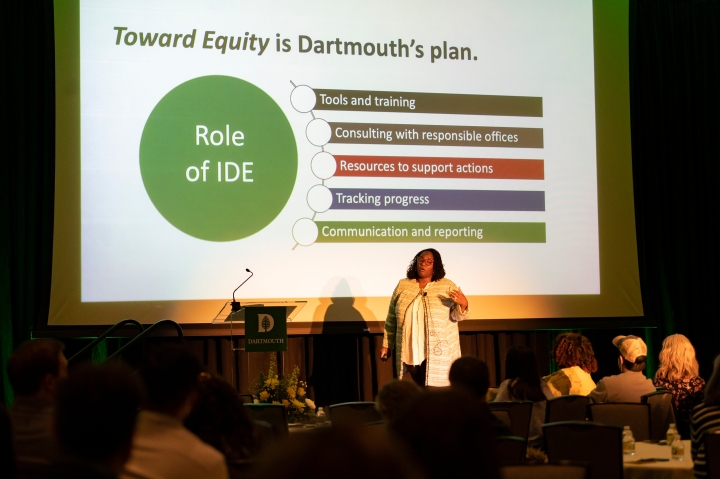Dartmouth leaders yesterday launched Toward Equity: Aligning Action and Accountability, the institution-wide plan for diversity, equity, inclusion, and belonging, to an enthusiastic crowd of 125 people at the Hanover Inn and another 95 who joined the event online.
The event began with a video showcasing faculty, staff, and students who spoke to why the launch of this plan is important.
In his welcoming remarks, President Philip J. Hanlon ’77 said the three-year strategic plan, which incorporates and improves upon DEIB initiatives created over the last decade, recognizes the progress Dartmouth has made, “but with the realization that we still have a long way to go.”
“Much like the plan itself, this work belongs to all of us,” Hanlon said. “I’m confident that, with your engagement and support, the systems and structures we put in place will not only become ingrained in the fabric of this institution, but will ensure that Dartmouth becomes a more equitable and supportive community for all.”
The plan was developed by Senior Vice President and Senior Diversity Officer Shontay Delalue and her team in the Division of Institutional Diversity and Equity after more than 15 months of engagement with faculty, staff, students, and alumni.
At the hourlong session, Delalue and Chloe Poston, associate vice president for strategic initiatives in Institutional Diversity and Equity, led an interactive presentation that included reflection, tabletop discussions, and audience polls.
Delalue started her remarks by acknowledging that countless people are grieving following last month’s mass shootings in California during Lunar New Year, “which is supposed to be a time of celebration in a number of Asian communities,” and the police killing of another unarmed Black man, Tyre Nichols, in Memphis.
“The weight of systemic forms of oppression is heavy,” Delalue said. “We are all gathered today with some semblance of hope for what we can do here at Dartmouth to dismantle systems that negatively impact groups based on their race, gender, religion, ability, sexual orientation, income, and the like.”
And while she recognizes that “we have made adjustments” at Dartmouth, “progress is not a pass for improving,” Delalue said. “The goal of the event today is to make sure each person can see, through their own lens and experiences, the role that they can play in moving us toward equity.”

The presentation included a brief overview of Toward Equity, which comprises four foundational elements—institutional definitions, development of an institutional climate survey, assessment and alignment of institutional resources dedicated to DEIB, and a repositioning of the Division of Institutional Diversity and Equity to best support the entire campus. The plan also includes strategic actions organized under four priority areas: coordination, structure, accountability, and assessment. One or more members of the Dartmouth Senior Leadership Group is designated as an accountable leader for each action, and the plan provides metrics for measuring the progress and outcomes of the actions.
Throughout the presentation, audience members were given time to write, and share with one another, what role they might play in Toward Equity going forward.
Depending on someone’s positionality and affiliation with Dartmouth, they might take on various roles outlined in Lily Zheng’s book DEI Deconstructed, such as advocate, educator, organizer, reformer, builder, or, perhaps, a backer, who “gives credibility to the work that we’re doing,” Poston said. “We’re talking a lot about institutional strategy, but there are so many other spaces where you can influence change.”
That might include something as involved as leading efforts to develop or advance a division’s strategic plan, or as small as changing the pictures in an office lobby to ensure it is a place where everyone feels welcomed and belongs, Poston said.
“Paying attention to these kinds of things will help you play your role, no matter how small, because every little piece coming together helps us to move forward,” she said.

After the event, Chara Abiah Lyons ’23, said she identifies with the role of a reformer.
“I care about my community and where I come from, and I believe in the power of my voice,” she said. “I, a Black woman, find the promise of change to be daunting, but I am hopeful for the future.”
One poll question asked participants, who responded in real-time via their smart phones, to share a word that comes up for them when they think about Toward Equity. As they typed, dozens of words appeared on the screen at the front of the room, with “hope” and “community” among the most common.
Paulita Lara Mejia, a second-year medical student at the Geisel School of Medicine, said her word was “belonging.”
“I really tried to make my own community, my own village here, and to make other people feel like they belong. But it feels really nice when, institutionally, you feel seen, you feel heard,” said Mejia, who represents Geisel on the IDE student advisory board. “The shift really makes me feel like more belonging is already happening.”
Matthew Duncan, MED ’01, an assistant professor of psychiatry and medical education, said he was encouraged by the launch session and noted that the psychiatry department at Dartmouth Health now has a staff person devoted to DEIB issues.
“I feel the momentum around diversity, equity, inclusion, and belonging, and how it continues to grow and deepen,” Duncan said. “Not only does it get bigger in scope, it’s penetrating down.”

